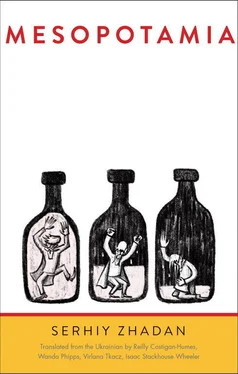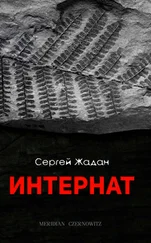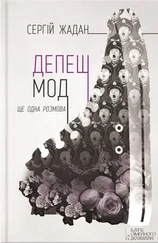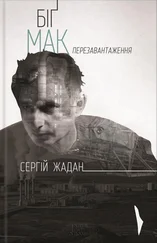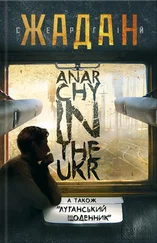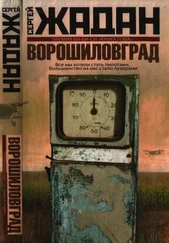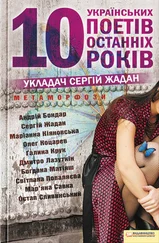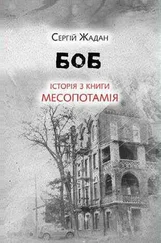Because she loves to warm her hands in other people’s pockets,
and knows every ticket collector on the night trolley,
she greets them only to interrupt
their loneliness, which lasts till dawn.
Because each of the lost ticket collectors
is chained by their own fear like to a galley,
hopelessly handing out tickets, and looking out the window—
for her, the passenger, who doesn’t care
what stop she gets off at to descend into the darkness,
what unhappy love affair she mourns,
what losses she regrets, what losses she doesn’t,
and what words she will use to tell me about it all.
□ □ □
Her stepfather was odd—
worked as a gardener for a Vietnamese family,
looking after trees, which would have grown without him
in the suburbs, past the factory, in the haze.
He counted off branches, like prisoners count off years,
hunted for foxes,
fed wild dogs straight from his hands.
Everyone thought he was crazy, even she agreed,
but explained,
“I love him, I need him,
so why is he constantly hiding in the trees, in the shadows?
When he steps out into the sun, why does he move so strangely,
as if he knew
where trouble was coming from?”
His employers couldn’t remember his name,
his friends didn’t recognize him, his family rejected him,
and used him to frighten children, who were not scared at all.
They ran after him onto the old railroad tracks,
and when he was sick, they pulled birds’ eggs out of nests,
as if they were taking bulbs out of street lamps.
I saw him only once, in the fall,
I noticed him walking, far away, from the back.
He was wandering in the shadows, frightening the stars,
carrying a ladder to cut some branches.
His demeanor was humble—he was simply exhausted.
That’s how Jesus carried his cross, I thought.
I also thought—this is easy for him,
knowing what to do, not noticing the emptiness,
remembering everything that was, accepting everything that is,
clearly imagining his future,
believing that nothing will change,
guessing that no one will escape,
shifting the ladder from one shoulder to the other.
I said as he passed,
Do what you have to do,
work is only part of our struggle,
faith is the sand that forms the foundation of our years,
and trees can’t really grow without gardeners.
□ □ □
It’s good, he thought, it’s good that I’m dead to her,
good that she’s forgotten my name,
good that this all happened so quickly,
good that I wasn’t there for all of it.
Good that she decided all this for us,
that I didn’t have to convince her to stop the nonsense,
didn’t have to watch her hesitate,
didn’t have to see her dark eyes.
Now it’s important to disappear, to choose the right course,
it’s important not to return to where I used to live,
it’s important not to go to familiar places,
not to frighten friends, or disappoint strangers,
not to wander into their dreams, not to touch their things,
not to look through their books, not to drink their wine,
not to hear their breathing, not to see their eyes,
not to feel what they themselves no longer feel.
It’s good that I can fly out of the chimney now,
walk through fire, fall on the grass,
feel the flow of the stuff that fills her dreams,
notice the cables that keep her afloat.
It’s a good thing that death is neither an achievement nor a loss,
good that our footsteps don’t give us away,
that nothing can be turned back,
that nothing can be lost forever.
What was there?
green warmth,
against the orange background
of the evening sky.
Golden moons,
blue fish in the river,
dark shadows
on her face.
□ □ □
What to do with the priests?
They graze their churches like cattle,
leading them to emerald-green pastures, watching
how their churches plop down into the river silt
to escape from the June sun.
They follow their churches, chasing them out of the neighbor’s
wheat fields, turning them toward home, where
evening fires are lit in cottages.
They sleep on bags and books, listening to the breath of sleeping animals,
recalling in dreams the faces of women who came and
told them their darkest sins,
asking for advice, awaiting forgiveness.
What kind of advice can he give you?
His entire life is spent herding echoes,
searching for pasturelands, and sleeping under a dark sky.
You can sing with him, you can
sleep next to him, covering yourself with an infantry jacket,
you can dry your wet clothes at the fire,
wash your shirts in the river.
He is ready to hang them in the church like a holy shroud.
What to do with the atheists?
They say, “Truly I believe, I believe in everything said,
but I will never admit it for any reason,
under any circumstances, that’s my business,
and only concerns me. Let him take offense
a hundred times and threaten me, get angry, and turn away from me on his crucifix,
anyway—What is he without me? What can he do alone?
He must struggle for my attention.
He is destined to fight for my redemption.
He must take into consideration my doubts, my
inconsistencies, my sincerity.”
What to do with you? You can sing with us,
stand in a circle with us, place your hands on our shoulders:
we are united in our faith,
united in our love,
in our loneliness,
in our disappointment.
What to do with all of us?
If he had just a little more time,
if he did not have to watch his domesticated church,
if he didn’t have to follow it, chase it out of yellow fields,
he would have more time for our
worrisome premonitions.
Love destroys
all our ideas of balance.
We can forget and stand to the side,
we can deny what we once said,
we can kiss the black lips of night—
we are the only ones touched by the flames of night,
we are the only ones who believe,
we are the only ones who will never
admit it.
You can talk about everything that you’ve dreamt.
You can talk, you don’t have to fear the dark:
someone will hear you anyway,
but no one will ever believe you.
□ □ □
The city where she hides,
burning with flags, lies under a snow-covered mountain pass.
Hunters chase wild animals out of Protestant churches,
blue stars fall into the lake,
killing slow-moving fish.
Oh, tightrope walkers dangle above the streets.
They balance in school
windows, inspiring awe.
They avoid the gulls on the lake
that grab weightless golden potato chips
out of her hands.
Where we once lived,
we didn’t have time for peace or reflection.
We struggled against the sharp reeds of the night,
threw off our clothes like counterweights down dark elevator shafts,
so we could be suspended in the air for one more night,
not loving and not forgiving
not accepting and not believing,
angrily experiencing the best days
of our lives.
Читать дальше
